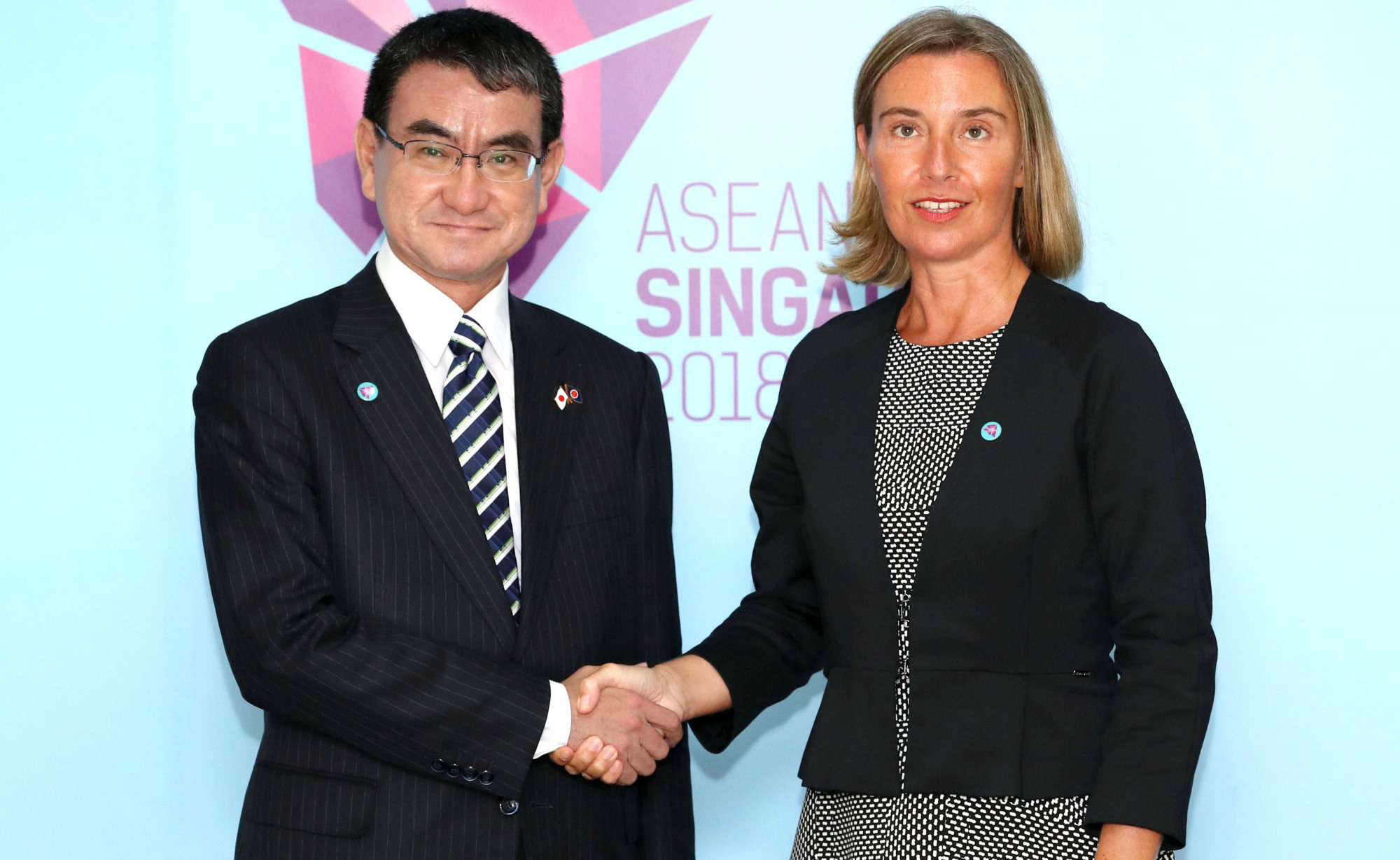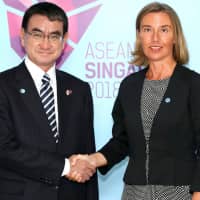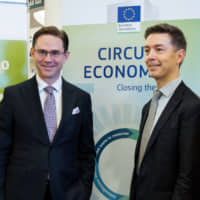It is with great pleasure that I address the readers of The Japan Times on Europe Day. The day marks the presentation on May 9, 1950, of the Schuman Declaration, which proposed the creation of a European coal and steel community that would evolve into the European Union. Five years after the end of World War II, the plan sought to make war between the great powers of a conflict-weary Europe impossible; the rest, as they say, is history.
Today, the EU is a symbol of peace. It is a unique economic and political union that has not only helped bring stability and prosperity to Europe but has now become a serious actor on the global stage, working to foster security, democracy, fundamental freedoms, rule of law and social justice at the international level. As such, we have a great deal in common with our strategic partner, Japan.
Today, the EU is a leading global power — the world's largest economy and trading bloc, and the top trading partner for 80 countries. The EU and its member states together provide more in development cooperation and humanitarian aid than the rest of the world combined.
How did we do it? After war and devastation, Europe prospered by embracing common values, reconciliation and integration into a multilateral, rules-based international system. This is the environment we need to continue to thrive. To our regret, we now find that we also need to fight to preserve it.
The principles of multilateral cooperation and respect for the rules that govern our international system are now facing the risk of being undermined. Protectionism and a geopolitical view of international relations are on the rise again. At home, with democracy a fundamental pillar of the EU, we have to address concerns over the health and viability of democratic processes.
In this environment, it has become fashionable to talk about the internal divisions in the EU. Yes, it is not always easy to agree among our member states. But make no mistake — the EU is ready to fight this fight and is even more determined to stand up for global, collaborative efforts to find solutions to global challenges. While the current multilateral system — or, for that matter, our domestic political systems — may not be perfect, the EU approach is to reform and improve, never to dismantle. Moreover, the EU is displaying strong unity in these endeavors.
Let me give some examples. The EU remains a strong supporter of global architecture for disarmament and non-proliferation. This is why the EU supports and will continue to support the nuclear deal with Iran. Iran has, as confirmed by the International Atomic Energy Agency multiple times, continued to implement its nuclear-related commitments. We are also contributing toward a complete, verifiable and irreversible denuclearization of the Korean Peninsula. The EU has imposed the toughest sanctions on North Korea and at the same time has kept channels open to encourage dialogue.
The EU is also a security player on the world stage. The EU approach to security and defense is through cooperation, investing in partnerships and deploying its trademark soft power — such as economic support, protection of human rights and promoting the empowerment of young people and women — while adding a credible hard power component. It currently has 16 military and civilian missions and operations on three continents as part of its Common Security and Defence Policy. These include missions in Ukraine, Mali and Somalia, and operations such as counterpiracy efforts off the coast of Somalia, where Japan's Self-Defense Forces are active alongside EU ships.
Closer to home, for nearly three years now, the EU has been dealing with the Brexit issue. I am sad to see a member of the EU family leave, but the EU institutions and the remaining 27 member states respect the decision of the United Kingdom's citizens. However, let's soften the impact on our citizens and partners as much as possible. The EU is committed to ensuring an orderly Brexit based on the withdrawal agreement and to forge a forward-looking future partnership with the U.K. At the same time, the 27 member states have rallied around our key objective to protect the integrity and strength of the EU.
As the world's largest single market, the EU is a flag bearer for free, fair and rules-based trade. We have reiterated this position many times and in many contexts, ranging from calling for reform of the World Trade Organization, rejecting moves toward managed trade and working to secure a level playing field with key trading partners, notably China. We also recognize the economic potential that can be gained through the prudent utilization of data. But the privacy of citizens must be sufficiently protected. Therefore, we have strengthened our data protection framework accordingly.
Europe is also at the forefront of efforts to tackle the global challenges facing us all, such as action to fight climate change and delivering on the United Nations Sustainable Development Goals by 2030.
Of course, we cannot change the world alone — and, I am pleased to note, we are not alone. In all the previously mentioned fields, the EU and Japan are strong, like-minded partners. This year marks a milestone in our bilateral relations, with the February entry into force of a wide-ranging economic partnership agreement (EPA) and provisional application of a strategic partnership agreement (SPA). These two pacts elevate our friendship to a new, strategic level, and we must seize the opportunities they present.
We already see very promising areas for bilateral cooperation such as "connectivity," where we strive to link Europe and Asia through various strands ranging from infrastructure projects to activities with a people-to-people dimension, such as collaboration in education, research and innovation, culture and tourism.
Regarding the latter, everyone is invited to join in a diversity of activities. The EU delegation together with member states has for many years worked on such events as the European Higher Education Fair, which this year takes place in Osaka and Tokyo on May 18 and 19, and EU Film Days, which will be held in the cities of Tokyo, Kyoto, Hiroshima and Fukuoka (dates vary, with the Tokyo event held from May 31 to June 27). We also organize annual visits of EU and EU member state ambassadors and diplomats to high schools across Japan under the "EU Comes to Your School" project. Furthermore, Europe and Japan have strengthened their partnership under such initiatives as Horizon 2020, the EU's framework program for research and innovation that offers nearly €80 billion of funding over seven years (2014 to 2020).
As EU ambassador, I am honored to acknowledge that Europe and the EU have many friends in Japan and look forward to continuing our excellent cooperation. It is particularly fortuitous that the year in which the EPA and SPA have broken new ground is the one when Japan presides over the G20. The EU will actively support Japan in the various ministerial meetings and the Osaka G20 summit in June. I am convinced that closer ties between us can bring peace, prosperity and tangible benefits — not only to our citizens but also to people around the world.
The EU Special was compiled in collaboration with the Delegation of the European Union to Japan and the European Business Council in Japan. The views expressed here do not necessarily reflect those of the newspaper.






















With your current subscription plan you can comment on stories. However, before writing your first comment, please create a display name in the Profile section of your subscriber account page.